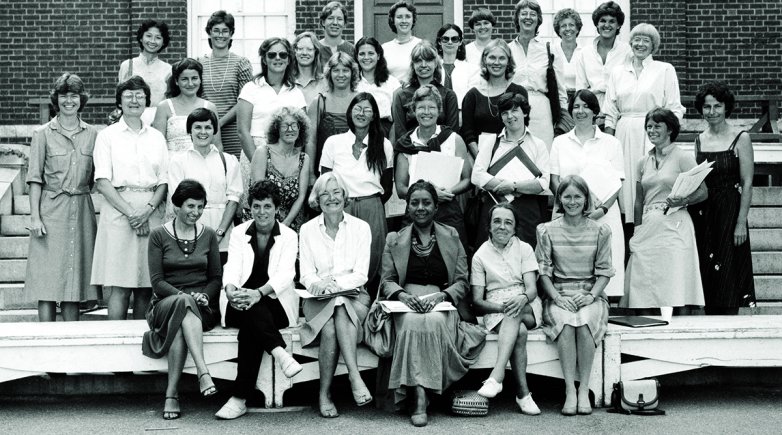Coeducation pioneers
The faculty members who opened the doors for others.
Women faculty of Phillips Exeter Academy in 1983.
Perhaps editors at the newspaper of record regarded the historic decision to integrate girls into a 189-year-old boys’ preparatory school dead on arrival — but a group of pioneering people on campus worked assiduously to ensure that girls and women thrived. Among these courageous changemakers were the women who joined the faculty and paved the way for those who followed.
Stepping first onto campus and into the school’s classrooms, women faculty not only taught Harkness in their subject areas, but also championed greater equity for girls in all areas of the Academy, from academics and athletics to student programming and residential life. These early days were full of promise and also rife with challenges — challenges that were met head-on with clarity and courage.
In a series of recent interviews, as well as in past Exonian articles and historical recordings, several of the women faculty members who worked in the nascent days of coeducation shared their experiences. Here are a few of their stories.
Faculty firsts
Lynda K. Beck ’80 (Hon.) was 28 years old when she was appointed as the first woman instructor in the Science Department in 1972. Armed with a master’s degree and a doctorate in chemistry from the University of New Hampshire, Beck found her initial obstacle wasn’t in the classroom. The physical structures of the school itself vexed progress. “I worked at a girls dorm and the girls used to joke that their dorm had a sex change,” she remembers. “They used to put potted plants in the urinals and water them.”
The tougher conversations arose when she was confronted with mindsets embedded in a portion of the male faculty who were simply not ready for women to be treated as their equals. “They had wives and daughters, but women faculty were different,” Beck recalls. “Each time I came into a department meeting; the men would stand and when I left, they would all sit. This happened for many years and I thought, ‘Geez, this is just so ridiculous,’ but I didn’t let on. I just got into it until one day it stopped. ... It wasn’t easy, but I worked hard thinking that I didn’t want other women who came after me to work as hard as I did.”
